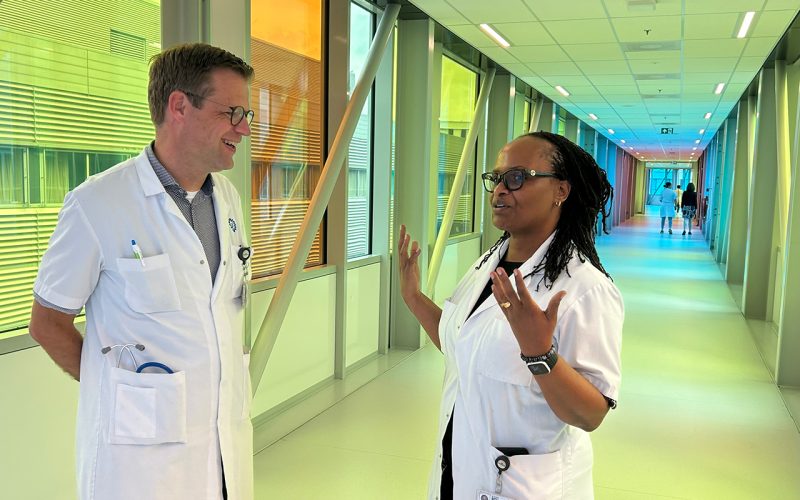By measuring blood oxygen levels in infants with a pulse oximeter, healthcare providers in Tanzania can provide a simple and affordable way to screen newborns early for congenital heart defects. This is one of the main recommendations of paediatric cardiologist Naiz Majani from Tanzania, who obtained his PhD in Utrecht on 3th of June.
In this PhD study, Naiz analysed data from more than 10,000 newborns from 2019 to 2024. She also examined how to improve care for children with congenital heart defects. She has found a simple and affordable method of screening newborns for heart disease that can be integrated into care in parts of Tanzania.
In Tanzania, 13,000 children with congenital heart defects need care every year. And 4,000 of them need surgery. 200 of them actually get that surgery. That may seem like a small number, but the East African country has evolved in the field of paediatric cardiology in recent years. The progress is linked to the international collaborations the country has entered into over the past 10 years, including with the Centre for Congenital Heart Defects at the Wilhelmina Children’s Hospital (WKZ), part of the Congenital Heart Defects Network. Through this national collaboration of academic centres, knowledge and expertise are combined to continuously improve the care for patients with congenital heart defects.
Naiz’s findings showed that late diagnoses often lead to poorer health and higher treatment costs. In contrast, children diagnosed and operated on early showed significantly higher survival rates and better quality of life. Early detection and treatment of congenital heart defects in children in Tanzania is therefore important. However, pregnant women there do not get a 20-week ultrasound like in the Netherlands, as expensive equipment is scarce and well-trained healthcare providers lack hands. Naiz therefore looked for another simple and affordable method to screen newborns for heart disease. And she ended up with pulse oximetry screening (POX screening) within 24 to 48 hours of birth, as is mandatory in many western countries.
Naiz Manjani is co-founder of the pediatric cardiology department at the Jakaya Kikwete Cardiac Institute (JKCI) in Dar es Salaam, Tanzania’s largest city. The link between UMC Utrecht and the hospital in Tanzania has been there for years. Several Dutch medical students travelled to the clinic and conducted research there. Martijn Slieker, paediatric cardiologist at the WKZ, has been providing an annual echocardiography training for paediatricians from all over Tanzania together with local paediatric cardiologists since 2019, and he is Naiz’s co-supervisor together with Rick Grobee, professor of Clinical Epidemiology. Utrecht paediatric cardiac surgeons Paul Schoof and Hanna Talacua also came to Tanzania and provided medical care to children with congenital heart defects. Martijn Slieker: ‘This international cooperation creates great opportunities for all involved and it ensures that we look at our work in care, research and education from new perspectives, something that benefits our young patients in both countries.’
The research on congenital heart defects in Tanzania is partly possible thanks to the UMC Utrecht Global Health PhD grant programme.
